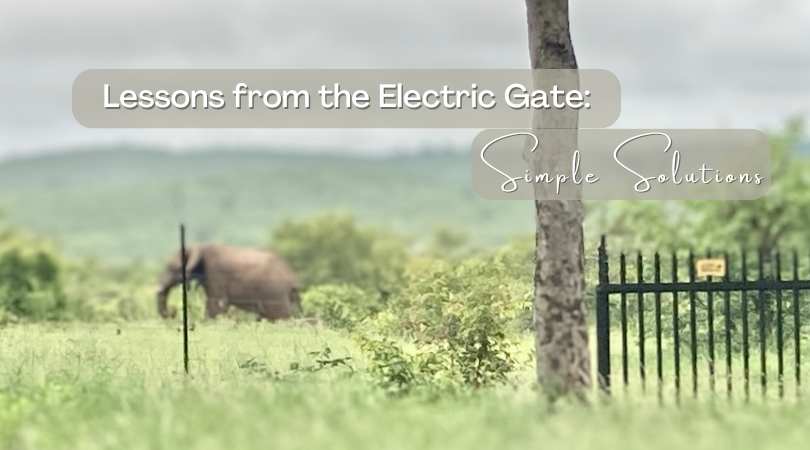
Aug 15, 2023 | My Blog
Recently, I had the opportunity to drive an automatic car. I hadn’t handled an automatic in ages, so I was a bit unsure and way out of my comfort zone. After a quick rundown on the basics to jog my memory, we were good to go.
Cruising through the Kruger National Park at a snail’s pace gave me all the time I needed to re-familiarize myself with the brake, figure out when to put it in Park, and locate Drive and Reverse.
The unexpected.
Out of the blue, I had to stop fast, and muscle memory went into action.
The car screeched to a sudden halt, we all got jerked forward in our seats. I had both my feet on the brake pedal, and that’s why we came to such an abrupt stop.
I immediately realised my mistake, yet I couldn’t convince my left leg to budge off the brake, even as we were all kind of slumped forward. Thankfully, no one got hurt, and it was more of a “whoa, what just happened?” moment.
As I tried to fix things, I was struck by how my head clearly and simply realized what had gone wrong, gave the message to my left foot to release, but my muscles point-blank refused. It had, after all been pressing that “clutch” to stop for the last 30 odd years!
It wasn’t until my muscles caught up with my brain’s lightning-fast realization that my body finally “got” what I needed to do to get us moving again.
This whole thing got me thinking. It’s kind of like how life throws curveballs at us, and we’re suddenly in this new situation or place. Our heads are all like, “Here’s how to fix it!” But our bodies? Well, they’ve been doing things their way for ages, and they’re not about to change their tune, even if the seatbelt’s all twisted up.
The takeaway?
I learned that I have to cut myself some slack and be patient. Letting my body catch up with my brain is pretty crucial, especially when things suddenly switch up on us.
The ultimate lesson however …
“if I want to move forward, I need to take my foot off the brake.”
If you are ready to take your foot off the brake, book your free Discovery session here https://calendly.com/marildawiegand/discovery-session

Jul 21, 2023 | My Blog
New Idea? Listen, Process, Pivot
As a small business owner, getting sucked into a vortex of confusion is par for the course.
Starting your own business is easy. Figuring out what you’re doing while carrying the weight of not only your own hopes and dreams but also those of your clients, employees, and family is another thing completely.
One of my frustrations is that we forget that being a small business owner takes a massive toll on you as a person and your own mental fitness.
Someone once told me that one of the biggest mistakes entrepreneurs make is that they say yes to things they should be saying no to.
This had a huge impact on me, as I most definitely fell into that trap, where I was willing to take on any project because I needed the money, rather than being a little more focused and careful with where I was spending my time and energy.
Nobody really talks about the vortex of confusion you find yourself in when you are seeing opportunities and potential linkages, but you don’t quite know whether you should pursue it or if you will be wasting your time and energy, which is, after all, limited.
Often when you wrestle with yourself about the yes or no in a particular situation or opportunity, that vortex of confusion can seem overwhelming.
In these moments, I’ve learned to break it down into simple steps.
I’ve learned that even if I don’t know what I want, I sometimes have ideas of what I DON’T want. For me, this has become like creating a carving, where you start taking away the bits that you don’t want until you get a clearer picture of what you do want.
Inevitably, you will be discussing your situation, thoughts, and ideas with others, not only people of your tribe but also potential clients and supporters. I’ve found this an invaluable exercise to help me find my next steps, and this is how I get there.
-
Listen
When talking to people about your thoughts and potential ideas, start by talking less and listening more. Listen not only to what the person is saying but also to what might be left unsaid or presumed. Listen with an open heart and without judgment to what the person is saying so you can understand, rather than listen to respond. Very often, people will say something off the cuff that kicks my thoughts into another path completely.
-
Process
Take the time to process what you’ve learned. Look for what exactly their pains are and think about the tools you have to help solve their problem. After all, whatever you’re selling or doing will need to solve someone’s problem; that’s why they buy it.
During this processing phase, I take the time to ask myself some hard questions:
- If I follow through with this idea, what will it cost me? Think about both financial and emotional costs.
- If I say YES to this, what am I saying NO to?
- If I say NO, what am I saying YES to?
- What does this idea make me feel?
-
Pivot
When you’ve done your research, you’re happy about the personal costs and benefits, and you feel energetic and excited (even nervous) about the idea, Pivot! Plan the smallest possible steps that will help you step towards making this new idea a reality.
This process is uncomfortable, confusing, frustrating, exhilarating, exciting and a whole host of other emotions that can really mess with your head. It takes time, but you give yourself that time to work through it.
The trick is to see it as the awesome gift that it is, where you get the opportunity to reinvent yourself, your ideas, and take active steps to making your own future better.
Stuck with the next steps? Set up a free Discovery session https://calendly.com/marildawiegand/discovery-session

Jun 23, 2023 | My Blog
Working in tourism is an incredible journey, filled with ups and downs, but finding the right fit in an organization can be a game-changer for your mental well-being.
Let’s explore why clicking with your team and company matters and how it boosts your mental fitness.
-
Feeling at Home:
Imagine being part of a tourism team where you truly belong. When you resonate with the organization’s values and culture, it’s pure bliss. This sense of belonging enhances job satisfaction and brings happiness to your work life.
-
Building a Supportive Squad:
Having a supportive work environment is like hitting the jackpot. When you fit in, you build genuine connections with colleagues and superiors. In an industry where you’re often away from family and friends, having someone who lifts you up, understands your struggles, and creates a safe space is crucial. It lowers stress and builds mental resilience.
-
Passion and Purpose Party:
Aligning with purpose and passion makes a huge impact. When you vibe with your tourism operation, work becomes meaningful. It’s like doing what you truly love. This alignment fuels your purpose and motivation, giving a major boost to your mental well-being.
-
Stress? No, Thanks:
Stress is a given in the Tourism Industry but imagine being stressed and burnt out all the time about where you find yourself. Not fun, right? When you don’t fit, stress and frustration become your uninvited guests. But finding that perfect fit makes work enjoyable, less overwhelming, and helps you maintain a healthy work-life balance.
-
Grow Like a Boss:
Ready to level up? Finding the right fit means endless opportunities for personal growth. When you align with your organization’s goals and values, they invest in your development, provide resources, and support your career growth. It’s about personal fulfilment, and your mental fitness will thrive.
So, what if you find yourself in a situation where you don’t fit?
Honestly, there’s nothing worse than trying to fit into a place where your heart tells you otherwise. Marius and I have both been there, accepting a job that should be amazing, only to end up unhappy and frustrated.
You convince yourself to stick it out, work harder, or wait for things to change. But often, they don’t. You end up with a broken heart and burnt out, all because society tells you not to run away from your problems.
But here’s the truth: just like you wouldn’t stay on the road when a truck is hurtling towards you, you shouldn’t stay in a job that doesn’t fit.
Put yourself first.
There are tools out there to guide and advise you. In this Fourth Industrial Revolution era, mind-blowing tech is changing the world, but you still need to understand what you really want.
For me, starting my own business brought anxiety and pressure, but the freedom it gave me was totally worth it. I realized I didn’t want to be stuck in an office. It’s about finding what truly makes you happy, fulfilled, and energized.
So, I challenge you to dig deeper, think about your own WHY. Reflect on what you’re doing right now and ask if it brings you joy, fulfilment, and energy.
If it does, that’s awesome!
But if it doesn’t, it’s time to take steps toward a better tomorrow
Your mental well-being matters, and finding your perfect fit in the tourism industry can lead to a brighter, happier future.
If you need guidance, don’t hesitate to book a free Discovery session with me: https://calendly.com/marildawiegand/discovery-session

Jun 20, 2023 | My Blog
Lately, I’ve been hearing from many of you: “I feel so Angry!”
I get it, we all face our own set of challenges, but it’s crazy how many of us are riding the anger train these days.
This got me thinking and diving deep into the anger abyss. What the heck is anger anyway? And why does it have such a hold on us?
Now, I can’t cover every angle in this blog, but I’ve got some thoughts to share:
Anger is a real beast. It’s a complicated and intense emotion characterised by feelings of displeasure, irritation, frustration, or even rage.
Here are some common triggers:
1. Frustration:
You know those moments when your dreams and desires get blocked or crushed? That frustration can simmer and eventually boil over into anger. Whether it’s unexpected roadblocks, annoying delays, or feeling like life’s treating you unfairly, frustration can ignite the fire within.
2. Threat or injustice:
Feeling threatened or feeling treated unfairly can unleash the fury. When you or someone you care about gets hurt or mistreated, anger becomes a righteous shield, protecting you from further harm and screaming, “Hey, that’s not right!”
3. Hurt or betrayal:
When someone you trust stabs you in the back or lets you down, anger comes knocking. It’s like a guard dog, protecting your heart and saying, “No more of that nonsense!”
4. Powerlessness:
Ever feel like you’re stuck in a never-ending loop of powerlessness? That’s enough to make anyone see red. When you feel like your choices are limited or there’s an unfair power dynamic, anger can become your battle cry.
5. Disappointment:
Ah, the sting of unmet expectations. When life fails to deliver what you hoped for, anger can bubble up in response to that crushing disappointment. Relationships, work situations, you name it – unmet expectations can be a real anger trigger.
6. Stress and pressure:
Who needs a pressure cooker when we’ve got stress and pressure cooking us from the inside? High levels of stress can turn up the heat, making us more susceptible to angry outbursts. It’s like our fuse gets shorter and shorter.
7. Emotional or physical pain:
Sometimes, anger serves as a protective shield against pain. When you’re hurting, either physically or emotionally, anger steps in to say, “Enough is enough!” It motivates us to take action or find relief from what’s causing us distress.
Anger is a normal human emotion, but we’ve got to work on it. Unleashing uncontrolled or chronic anger can wreak havoc on our well-being, relationships, and overall happiness. We need to find healthy ways to express and manage it. Life is too short for constant rage.
So what now?
Sometimes, what we think is anger is actually something else entirely. The trick is to find out what it’s all about.
Ask yourself:
-
Do you understand what is making you feel angry?
-
Is it really Anger or is it something else?
When the pressure’s on, I’ve discovered that by understanding what’s really going on beneath the surface, I can tackle the real issue head-on. I’ve learnt (and am still learning) that when my softer habits are under pressure, I need to use my stronger habits to take small steps forward.
Sounds simple, right? Well, here’s the thing…it’s a process. A messy, beautiful, uncomfortable and oh-so-worth-it process.
Sometimes, taking that first step means reaching out for help. And guess what? You’re not alone on this wild journey.
We’ve got the power to conquer anger and bring more joy and peace into our lives.
Ask yourself, what is the smallest possible step I can take to make the situation better, and then DO IT!
If anger’s got you in a headlock or if you just need some guidance, don’t hesitate to book a free Discovery session: https://calendly.com/marildawiegand/discovery-session

Jun 2, 2023 | My Blog
The last few weeks I’ve had a love/hate relationship with our electric gate. Several times it’s gotten stuck on me, and I’ve had to either manually open it or, on more than one occasion, had to bundu bash all around the fence to get access to my own home.
Nothing frustrates me more than something that ONLY has ONE thing to do (Open the gate) and then it DOESN’T. It breaks my brain.
Of course, Marius has been away and of course these types of things always happens when he, and his conceptually fit, problem-solving Ninja skills, aren’t here.
When he got back, I asked him to please help and this morning he showed me how the remote is now working very well.
What did he do? He changed the batteries, of course.
I had to laugh at myself.
Here I’ve been resetting the energiser, rebooting the gate motor, making my poor father-in-law open the gate by hand and I didn’t even think to check the batteries in the remote control!
This reminded me that we so often get stuck with solving the problems quickly that we don’t take the time to think deeper about the better solutions.
It’s a theme I’ve been picking up with some of my clients the last few weeks as well. We seem to be in crisis mode… solve the problem quickly deal with the rest later.
The trouble with that is that our solutions then become convoluted and complicated. It solves the problem in the short term but it’s not always a sustainable solution.
And then, when we look for the complicated solutions we forget about the basics.
This is what I learnt:
-
Take a step back:
Pause and reflect instead of rushing to solve problems quickly. Think deeper and consider better solutions rather than settling for temporary fixes that might bite you at a later stage.
-
Simple solutions:
Sometimes the most basic solutions can resolve complex issues. Checking the batteries in the remote control was the simple fix that solved the problem. Revisit the basics and ensuring all essential elements are in order before pursuing complex solutions.
-
Avoiding complicated solutions:
Solving problems in crisis mode can lead to complicated and unsustainable solutions. By taking the time to think critically and explore deeper options, you can find more effective and long-lasting resolutions.
-
Get help:
If you can’t solve the problem on your own, don’t get stuck on it, ask for help
Whatever problem or challenge you are having right now… have you checked the batteries?
Not sure which batteries you need to check, I’m here to help. Book your free Discovery session here https://calendly.com/marildawiegand/discovery-session

May 19, 2023 | My Blog
Picture this: you’ve got check-ins, check outs, quotes and breakfast to sort out. You’re juggling a million things, and sometimes it feels like your head is about to explode.
We’ve all been there, right?
As a Tourism Professional, you’re a hero taking care of others, but are you using those superpowers for yourself? It’s time to check in and see if your mental fitness is on point.
Mental health is a big deal these days. It refers to your overall psychological well-being. It includes your emotional, social, and cognitive health.
Mental Fitness on the other hand, refers to your ability to cope with stress and challenges. It’s all about building resilience, handling stress like a pro, and keeping your well-being in check, both on and off the job.
Now I want you to stop for a minute, take a good, hard look and ask yourself if, right now, any of these are happening to you?
-
-
Feeling overwhelmed or stressed?
-
Trouble sleeping?
-
Appetite going haywire?
-
Feeling irritable or angry?
-
Trouble concentrating?
-
Feeling anxious or down?
-
Decision-making becoming a mission impossible?
-
Social activities taking a backseat?
-
Risky or unhealthy behaviours creeping in?
-
Scary thoughts of self-harm or suicide?
If any of these ring a bell, don’t wait another minute – reach out to a trusted friend, family member, or a mental health professional.
Let’s get into building that mental fitness of yours. It’s like hitting the gym, but for your mind. Here are some tips to boost your mental well-being:
Me- time is non-negotiable.
Make self-care a priority. You deserve to pamper yourself. Sweat it out with exercise, indulge in hobbies, or simply chill in nature. Whatever floats your boat and makes you feel alive. You do you!
Stress.
Find what helps you unwind—deep breaths, journaling, talking it out. Anything goes, as long as it leaves you feeling lighter and easier to breathe.
Be your own cheerleader.
Ditch the negative self-talk and celebrate your awesomeness. Celebrate your wins, strengths, achievements, and all the things that make you unique. You’re a superstar.
Surround yourself with uplifting people who radiate good energy. Friends, family, and colleagues who’ve got your back.
Learn the art of saying no and create a work-life balance that works for you. Set clear boundaries to protect your well-being. Remember, you can’t pour from an empty cup.
Level up your skills!
Engage in activities that ignite your brain and make you grow. Dive into fascinating books, learn new skills, chase your passions, and set goals that light a fire within you. Your personal growth is a epic adventure.
Bounce back like a champ!
Life throws curveballs, but you’re a pro at finding solutions. Embrace challenges as opportunities for growth. Develop those resilience muscles and keep that positive spirit alive.
Fit body, fit mind!
Take care of your physical health too. Good food, enough sleep, and getting your body moving are building blocks for your overall well-being.
Embrace your Zen!
Practice mindfulness. Be present in the moment, notice your thoughts, emotions, and sensations without judgment. Dive into activities that bring you back into the now.
Seeking support is a sign of strength, not weakness.
If you’re stuck, reach out to a pro who can be your mental fitness coach. You’re never alone on this journey!
Building mental fitness is all about finding what works for you and embracing the journey. Be patient, kind to yourself, and take small steps forward. If you struggle, the bite you have taken might be too big, take a smaller bite.
Working towards every day being 1% better than yesterday is the way forward. You’ve got this!
Make a positive change. Book your free Discovery session with me today.







Recent Comments